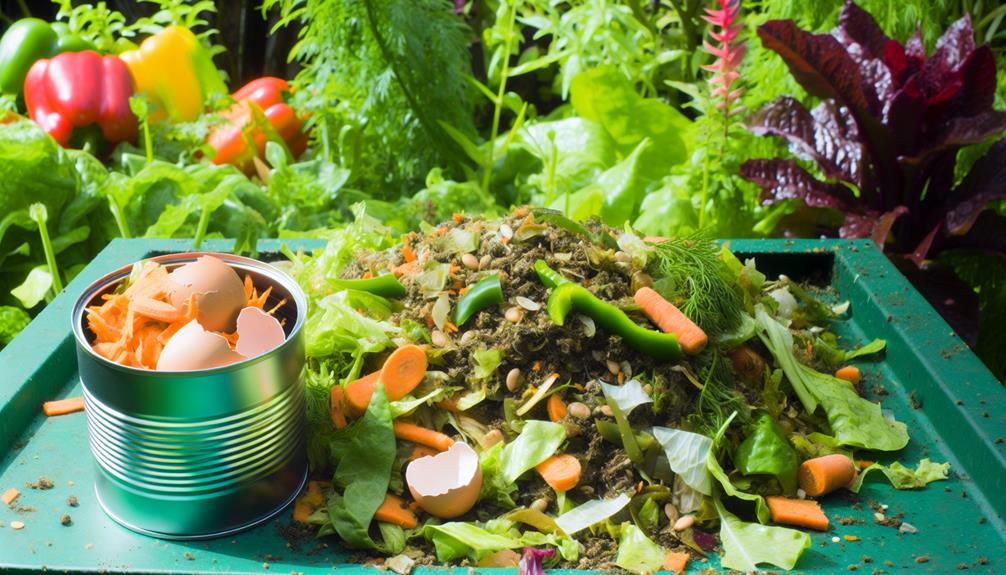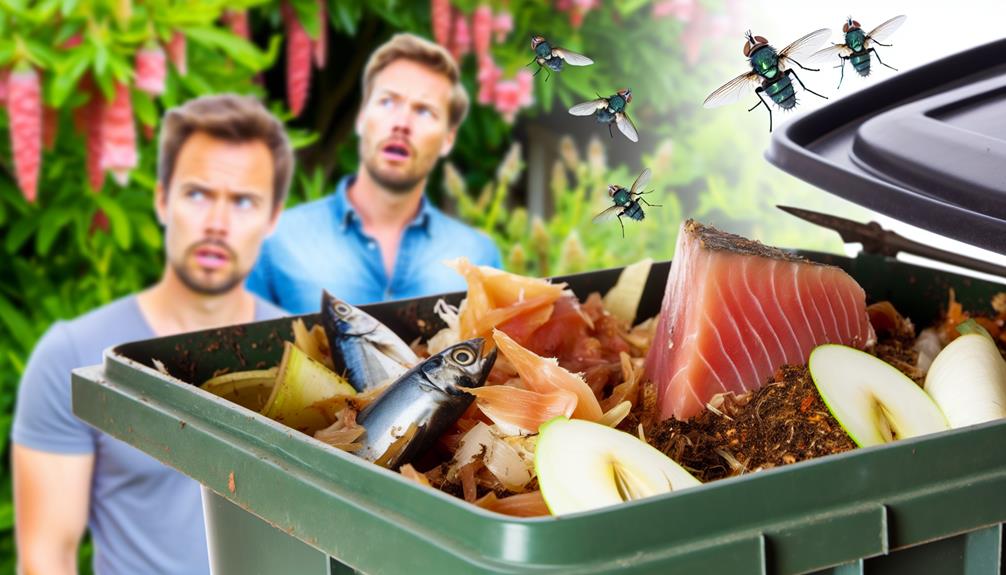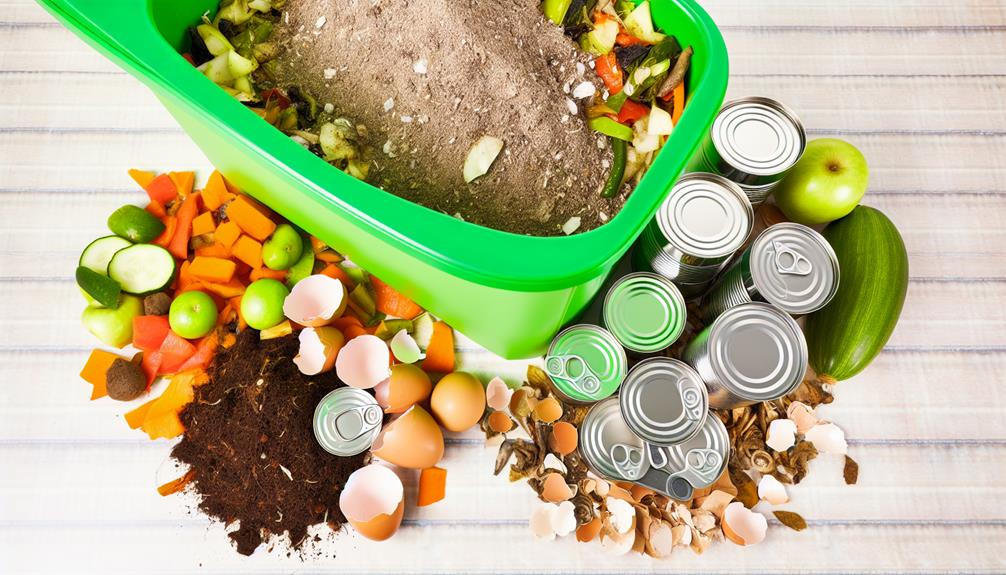

You can compost tuna, but it’s important to follow specific guidelines. Tuna is rich in nitrogen and phosphorus, which benefit plants, but it decomposes quickly, creating strong odors and attracting pests. To avoid these issues, mix tuna with carbon-rich materials like dried leaves and bury it deep in your compost pile.
Store tuna in a sealed container before composting to control odors. Turn your compost regularly for proper aeration and monitor moisture levels to prevent sogginess. If you manage your compost properly, you’ll create a nutrient-rich environment for your plants. For more detailed techniques and tips, keep exploring.
When you consider adding tuna to your compost, it’s important to understand how it breaks down and affects the composting process. Tuna, like other fish, contains high nutrient content that can enrich your compost. These nutrients, such as nitrogen and phosphorus, are essential for creating fertile soil.
However, the decomposition process for tuna is different from plant-based materials. First, tuna decomposes quickly due to its high protein and moisture content. This rapid breakdown can speed up the overall composting process, but it also means you need to manage it carefully. Make sure to balance the tuna with plenty of carbon-rich materials like leaves, sawdust, or shredded paper. This balance helps to avoid unpleasant odors and keeps pests at bay.
Moreover, it’s important to bury the tuna deep within the compost pile. Doing so ensures that it decomposes effectively and doesn’t attract unwanted animals. Regularly turning your compost will aid in evenly distributing the nutrients and maintaining proper aeration.
Also Read: Can You Compost Bones?
By composting tuna, you can greatly enhance the nutrient content of your compost, resulting in richer, more fertile soil. Tuna is packed with essential nutrients like nitrogen, phosphorus, and omega-3 fatty acids that can substantially boost the nutrient density of your compost. This, in turn, promotes healthier plant growth and more bountiful yields.
Here’s a quick breakdown of the benefits:
| Benefit | Explanation | Result |
|---|---|---|
| High Nitrogen Content | Tuna adds essential nitrogen to your compost. | Promotes leafy growth. |
| Phosphorus | Enhances root development and flower blooming. | Stronger, healthier plants. |
| Omega-3 Fatty Acids | Improves soil structure and microbial activity. | Better soil health. |
Including tuna in your compost pile provides an excellent source of nitrogen, which is vital for the growth of green, leafy plants. The phosphorus in tuna helps with root and flower development, ensuring your plants are strong and productive. Omega-3 fatty acids present in tuna can improve soil structure and boost microbial activity, contributing to overall soil enrichment.
When you compost tuna, you’re not just recycling waste; you’re creating a thriving environment for your plants. This sense of community and shared purpose in enriching your garden can be incredibly fulfilling. So, add tuna to your compost and watch your garden flourish!
Composting tuna presents several risks and challenges that you should be mindful of to guarantee a successful composting experience. One of the primary concerns is the potential for health hazards. Tuna, like other fish, can harbor harmful bacteria and pathogens that could pose risks if not properly managed. These health hazards can spread through your compost, potentially contaminating your garden soil and the produce you grow.

Another significant issue is pest problems. Tuna’s strong odor can attract unwanted visitors such as rodents, raccoons, and even neighborhood pets. These pests can disrupt your compost pile, scatter materials, and make it difficult to maintain the right balance of ingredients. Additionally, flies may be drawn to the decomposing fish, leading to an increase in maggots and other insects.
You also have to be cautious about the moisture levels in your compost. Tuna is a wet material and can make your compost too soggy, which can lead to anaerobic conditions. This results in a foul smell and slows down the composting process.
Also Read: Can You Compost Body Wash?
To successfully compost tuna while mitigating risks, it’s important to follow a few key best practices. First, guarantee proper storage of tuna before adding it to your compost pile. Store it in a sealed container to prevent odors and pests. When you’re ready to compost, use specific composting methods to handle organic materials like tuna.
Consider using a three-bin system to manage different stages of decomposition:
| Bin 1 – Fresh Waste | Bin 2 – Active Composting | Bin 3 – Finished Compost |
|---|---|---|
| Add fresh tuna and other food scraps | Turn and aerate regularly | Use as soil amendment |
| Layer with browns (leaves, cardboard) | Monitor moisture levels | Ensure it’s fully decomposed |
| Cover to deter pests | Maintain temperature | Store properly for later use |
Always mix tuna with plenty of carbon-rich materials (browns) like dried leaves or cardboard. This balance helps minimize odors and speeds up decomposition. Regularly turning your compost pile ensures it stays aerated, which is vital for effective breakdown and odor control.
Lastly, monitor moisture levels; your compost should be as damp as a wrung-out sponge. By following these best practices, you can compost tuna efficiently and safely, contributing to a healthier garden and a more sustainable lifestyle.
Also Read: Can You Compost Blood?
If composting tuna seems challenging, there are alternative solutions you might consider to manage your food waste effectively.

One practical approach is using compostable containers to store your food scraps. These containers can help reduce the impact on the environment by breaking down naturally. They’re available in various sizes and can be used for both household and garden waste management.
Another option is to explore local waste management programs. Many communities offer specialized waste collection services that handle organic and non-compostable waste differently. Check with your local waste management facility to see if they accept food scraps like tuna. Some places even have drop-off points for organic waste, ensuring it’s processed in an eco-friendly manner.
Additionally, you can look into anaerobic digestion. This process involves breaking down food waste in the absence of oxygen, producing biogas and nutrient-rich slurry. While this mightn’t be feasible at a household level, some municipalities have facilities that process food waste this way.
Lastly, consider reducing your food waste by planning meals and buying only what you need. This simple but effective strategy can significantly minimize the amount of waste you generate, making waste management easier and more sustainable.
Yes, composting tuna can attract wildlife and pests. To prevent this, understand wildlife behavior and implement pest prevention strategies, like burying the tuna deeply or using compost bins with secure lids. You’ll keep your compost safe and community-friendly.
You’ll find that tuna takes a few months to decompose in compost. Its nutrient breakdown benefits soil, but consider the environmental impact. Join our community in composting responsibly to minimize attracting pests and wildlife.
You shouldn’t compost canned tuna with oil due to potential oil leakage and tin contamination. Let’s keep our compost clean and safe. Stick with composting plant-based scraps to protect our shared environment and community garden.
You should check your city’s urban regulations and composting laws before composting tuna. Some areas restrict animal products due to pests and odors. Being informed guarantees you’re composting safely and responsibly, fostering a community that cares.
You should definitely balance your compost by adding carbon materials like leaves or straw. Tuna is rich in nitrogen sources, so combining it with these carbon materials will create a healthier, more effective compost. Happy composting!
Composting tuna is possible but requires caution. It’s rich in nutrients, yet it can attract pests and produce odors. To minimize risks, bury tuna deep in the compost and balance it with plenty of carbon-rich materials like leaves or paper.
Always maintain proper composting conditions, such as adequate aeration and moisture. Alternatively, consider other methods like vermicomposting or using a Bokashi bin.
By following these tips, you can effectively and safely compost tuna.
